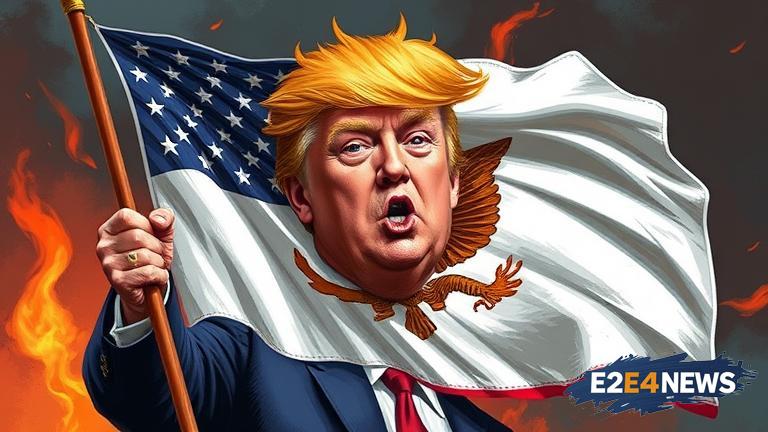President Trump has recently signed an executive order that seeks to ban the burning of American flags, a move that has sparked intense debate and backlash from conservative groups. The order, which has been met with widespread criticism, aims to prohibit the desecration of the American flag, including burning, defacing, or otherwise destroying it. Conservative groups have been quick to react to the order, with many expressing outrage and disappointment at the move. Some have argued that the order is an attack on free speech and the First Amendment, while others have praised the move as a necessary step to protect the symbol of American patriotism. The issue of flag burning has long been a contentious one, with many Americans viewing it as a form of protest and others seeing it as a disrespectful act. The Supreme Court has previously ruled that flag burning is a form of protected speech under the First Amendment, but Trump’s executive order seeks to challenge this ruling. The order has been met with widespread criticism from civil liberties groups, who argue that it is an attempt to suppress free speech and stifle dissent. Despite the backlash, Trump has remained defiant, tweeting that the order is necessary to protect the American flag and the values it represents. The move has also sparked a wider debate about the role of the executive branch in regulating free speech, with many arguing that the order is an overreach of presidential power. As the debate continues to rage, it remains to be seen whether Trump’s executive order will be upheld or challenged in the courts. The issue is likely to be a major point of contention in the upcoming election, with many Democrats and Republicans already weighing in on the issue. The American flag has long been a symbol of patriotism and national pride, but the issue of flag burning has always been a divisive one. Many Americans view the flag as a sacred symbol that should be treated with respect and dignity, while others see it as a powerful symbol of protest and dissent. The Supreme Court’s previous ruling on the issue has been widely criticized by conservatives, who argue that it is an attack on traditional values and patriotism. Trump’s executive order has been seen as a attempt to appeal to his conservative base, but it has also sparked widespread criticism from moderates and liberals. The order has also raised questions about the limits of presidential power and the role of the executive branch in regulating free speech. As the debate continues to unfold, it remains to be seen whether Trump’s executive order will be successful in banning flag burning or whether it will be challenged in the courts. The issue is likely to be a major point of contention in the upcoming election, with many candidates already weighing in on the issue. The American people are deeply divided on the issue, with many viewing it as a matter of free speech and others seeing it as a matter of patriotism and national pride. The debate is likely to continue for many months to come, with no clear resolution in sight. The executive order has also sparked a wider debate about the role of the government in regulating speech and expression, with many arguing that it is an overreach of presidential power. The issue of flag burning is a complex and contentious one, with many different perspectives and opinions. The Supreme Court’s previous ruling on the issue has been widely criticized, but it remains to be seen whether Trump’s executive order will be successful in overturning it. The American flag is a powerful symbol of patriotism and national pride, but it is also a symbol of protest and dissent. The issue of flag burning is likely to continue to be a major point of contention in American politics, with no clear resolution in sight.
